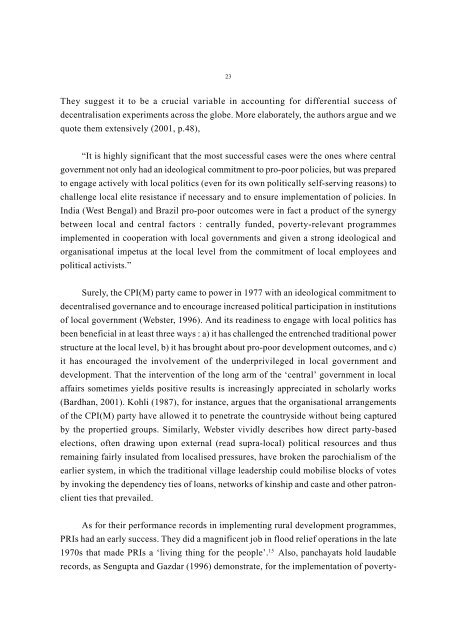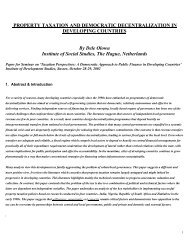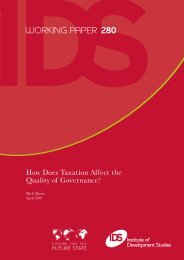View Article - Institute of Development Studies
View Article - Institute of Development Studies
View Article - Institute of Development Studies
You also want an ePaper? Increase the reach of your titles
YUMPU automatically turns print PDFs into web optimized ePapers that Google loves.
23They suggest it to be a crucial variable in accounting for differential success <strong>of</strong>decentralisation experiments across the globe. More elaborately, the authors argue and wequote them extensively (2001, p.48),“It is highly significant that the most successful cases were the ones where centralgovernment not only had an ideological commitment to pro-poor policies, but was preparedto engage actively with local politics (even for its own politically self-serving reasons) tochallenge local elite resistance if necessary and to ensure implementation <strong>of</strong> policies. InIndia (West Bengal) and Brazil pro-poor outcomes were in fact a product <strong>of</strong> the synergybetween local and central factors : centrally funded, poverty-relevant programmesimplemented in cooperation with local governments and given a strong ideological andorganisational impetus at the local level from the commitment <strong>of</strong> local employees andpolitical activists.”Surely, the CPI(M) party came to power in 1977 with an ideological commitment todecentralised governance and to encourage increased political participation in institutions<strong>of</strong> local government (Webster, 1996). And its readiness to engage with local politics hasbeen beneficial in at least three ways : a) it has challenged the entrenched traditional powerstructure at the local level, b) it has brought about pro-poor development outcomes, and c)it has encouraged the involvement <strong>of</strong> the underprivileged in local government anddevelopment. That the intervention <strong>of</strong> the long arm <strong>of</strong> the ‘central’ government in localaffairs sometimes yields positive results is increasingly appreciated in scholarly works(Bardhan, 2001). Kohli (1987), for instance, argues that the organisational arrangements<strong>of</strong> the CPI(M) party have allowed it to penetrate the countryside without being capturedby the propertied groups. Similarly, Webster vividly describes how direct party-basedelections, <strong>of</strong>ten drawing upon external (read supra-local) political resources and thusremaining fairly insulated from localised pressures, have broken the parochialism <strong>of</strong> theearlier system, in which the traditional village leadership could mobilise blocks <strong>of</strong> votesby invoking the dependency ties <strong>of</strong> loans, networks <strong>of</strong> kinship and caste and other patronclientties that prevailed.As for their performance records in implementing rural development programmes,PRIs had an early success. They did a magnificent job in flood relief operations in the late1970s that made PRIs a ‘living thing for the people’. 15 Also, panchayats hold laudablerecords, as Sengupta and Gazdar (1996) demonstrate, for the implementation <strong>of</strong> poverty-





